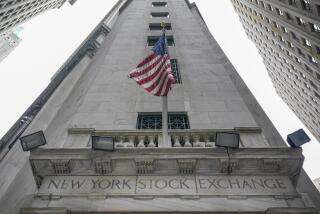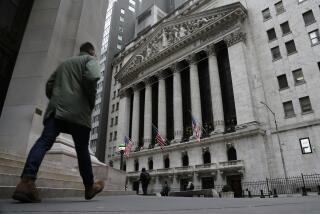Fed Would Fight Panic With Cash : Stock Market: The central banks of the U.S. and other major countries say they have procedures in place to quell a further price slide.
WASHINGTON — The Federal Reserve Board and central banks of other major industrial countries, bracing for the possibility that Friday’s Wall Street plunge could continue in markets both here and abroad, prepared Sunday to provide the financial system with large amounts of cash to ward off any panic.
A senior Federal Reserve Board official said the U.S. central bank was “obviously . . . ready to provide whatever liquidity is needed” for the markets and the economy today and had contingency plans to follow that up with further actions “if it ultimately becomes necessary.”
At the same time, he said, the Fed has made arrangements with the Bank of Japan and the West German Bundesbank for the three central banks to coordinate their actions in case the stock market slide begins to spread overseas, as it did during the Black Monday crash on Oct. 19, 1987.
He said officials of the Fed and its counterparts in other major industrial countries have worked out detailed procedures for handling any possible slide. “We all have a pretty good understanding of what needs to be done,” he said.
In Paris, French Finance Minister Pierre Beregovoy told a newspaper: “One must not panic but keep a cool head. This calls for very close cooperation among economic and monetary officials.”
Tadashi Okada, a director of the Bank of Japan, predicted Sunday that the impact in Tokyo would be limited. “There might be some panic selling,” he said, “but most investors may watch the situation coolly.”
Most analysts expect prices on Wall Street to fall initially when the U.S. markets open today, mainly because large investors who rely on computer-driven programs to buy and sell huge portfolios of stocks probably need to keep selling to cover bets they made in the futures market late Friday.
Any Fed move to inject more cash into the banking system would be designed to counter such a tendency and encourage a rapid return to relative stability in the markets. It would also reduce the risks of a brokerage house or other financial institution going belly-up, which could set off a wider selling panic.
As part of the process, interest rates are likely to fall.
Stocks of airlines and other takeover candidates are expected to be particularly vulnerable because Friday’s failure of a takeover deal involving United Airlines raised doubts about the riskiness of a number of current and potential deals financed by junk bonds.
These developments were under discussion as Fed Chairman Alan Greenspan and Treasury Secretary Nicholas F. Brady conferred privately Sunday and talked by telephone with stock market officials. They agreed on a general strategy, both Fed and Administration officials said, of trying to ride out the market’s opening today and move quickly if government help is needed.
“Brady and Chairman Greenspan and (Richard Breeden), the chairman of the SEC (Securities and Exchange Commission), and others have been in close contact,” White House Budget Director Richard G. Darman said on ABC’s “This Week with David Brinkley.”
“I’m sure they’ll do what’s right, what’s prudent, what’s sensible,” Darman added.
A senior Fed official said Sunday the central bank initially would try to check any resumption of the market slide by flooding the banking system with additional reserves and dissuading banks from choking off credit to brokerage houses and other investment institutions such as mutual funds.
If the actions expected today do not help quell a run on the markets, officials said, the Fed chairman is prepared to issue a formal statement reiterating the willingness of the central bank to provide the cash needed to bolster the financial system.
Finally, if banks still appear too apprehensive to provide the usual lines of credit to would-be borrowers, officials plan to begin “jawboning” banks--that is, calling senior bank executives and urging them to protect major Wall Street institutions against failure.
Although Fed officials believe they can pump additional cash reserves into the economy without changing overall monetary policy to push interest rates down deliberately, interest rates are still likely to fall in reaction to any such Fed action.
The reason is that the Fed largely influences interest rates through its almost daily “open market” operations in New York with major banks and bond dealers. The central bank affects interest rates whenever it buys and sells Treasury debt instruments that both the banks and the Fed hold in their portfolios.
To ease credit, the Fed buys Treasury bills from banks, providing the banking system in return with cash that can be used to make new loans and pump up the money supply. That tends to pull interest rates down.
Such steps, which the Fed is expected to follow as needed today, are the reverse of what the central bank does when it wants to tighten credit in an effort to keep inflation under control.
By selling Treasury debt it holds, the Fed drains cash from the banking system, curbing banks’ ability to make new loans and tending to push interest rates up.
Sen. Phil Gramm (R-Tex.), interviewed on NBC’s “Meet the Press,” said he regarded the Federal Reserve decision to make money freely available to the markets as a “sufficient” reaction to the market plunge.
“I don’t know whether prices are going to go up or down on Monday,” Gramm said. But he asserted that improvements brought about after the 1987 crash mean the “mechanism is strong enough” and “the clearing process is big enough” to stave off any panic in the financial markets.
The Fed provided just such an injection of cash right after the Black Monday crash of two years ago, and was widely credited with helping to prevent the plunge from wiping out major financial institutions and possibly pushing the economy into a recession.
In the 1987 incident, however, the central bank did not act until Tuesday morning following Monday’s crash, when the stock market had already fallen 508 points in the worst single-day plunge since the Great Depression.
This time, though, the Fed has moved to calm traders even before the market opens. Indeed, the timely early warning, if it assuages investors, may help prevent the need for the Fed to take any further action.
By contrast, the Fed was blamed in 1987 for contributing to the onset of the bear market downturn weeks before the October crash by confusing investors with a series of seemingly contradictory actions.
When Greenspan took the helm of the Fed in August, he immediately acted to push up interest rates in an effort to prove his inflation-fighting credentials and support the then-shaky value of the U.S. dollar on international markets.
That started the market’s initial slide from its August peak. But the week before the crash, Greenspan publicly dismissed the danger of inflation--paradoxically adding to fears that interest rates could rise even further because the Fed might not move strongly enough against any inflationary threat.
On Sunday, however, Fed officials reiterated the view that the current situation is far different from the one that preceded Black Monday in 1987--and that both the stock market and the economy are far less vulnerable than they were back then.
In retrospect, it is clear that in 1987 the economy was overheating, raising the specter of higher inflation and rising interest rates.
Moreover, a public feud between then-Treasury Secretary James A. Baker III and West German monetary officials added to fears that the Ronald Reagan Administration was trying to push the weak dollar down even further, adding fuel to the fire of higher inflation and interest rates.
Today, however, the economy is growing far more moderately, inflation pressures appear to have eased at least for awhile and the dollar has strengthened considerably from its low point early last year.
The Fed has also been holding interest rates steady after an earlier easing of credit this summer. Also, top U.S. policy-makers are not openly feuding with either West Germany or Japan.
Rather, analysts said, the latest stock market slide stemmed mainly from growing apprehension on Wall Street that declining earnings of corporations no longer would be offset by big-ticket deals involving leveraged buyouts of large companies, which were financed through junk bonds.
Although the stock market “ignored the earnings disappointments,” said William C. Melton, chief economist for IDS Financial Services in Minneapolis, the failure of deal makers to obtain financing for a proposed leveraged buyout of UAL Corp., United Airlines’ parent company, on Friday sent investors panicking over the end of junk bond financing.
“What the UAL incident showed was that the party is over and the banks are not going to ‘take care of everything’ by continuing to finance these kinds of deals as freely,” Melton said. “The market already was down 25 points when the UAL thing hit. It went all the way.”
In Washington, bankers gathering for their annual convention saw a silver lining in the storm clouds produced by Friday’s stock market.
“What we were seeing was a house of cards, bound to come tumbling down. I hope the United Airlines thing marks a more conservative approach by banking throughout,” said Donald T. Senterfitt, vice chairman of Sun Trust Bank of Orlando, Fla.
“It’s important that the LBO thing is slowing down now,” said banking analyst Alex Sheshunoff, “rather than reaching the (detrimental) proportions that it could have.”
Both government officials and private economists continued to predict that the downturn--assuming it does not go much further and turn into a full-fledged panic--is unlikely to have much impact on the performance of the economy.
Officials said there currently were no plans to try to shut down the stock markets or other financial markets or to interfere with what authorities have called a “technical adjustment” going on now.
“We don’t want to pick winners and losers,” a top Fed official said.
Staff writer Douglas Jehl contributed to this story.
Advice to INVESTORS
Long-term investors may want to wait out today’s expected turmoil, analysts say. D1
More to Read
Inside the business of entertainment
The Wide Shot brings you news, analysis and insights on everything from streaming wars to production — and what it all means for the future.
You may occasionally receive promotional content from the Los Angeles Times.










